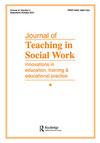#Resist: Utilizing Racial Justice Teach-ins to Challenge Anti-Black Racism
IF 0.9
Q3 EDUCATION & EDUCATIONAL RESEARCH
引用次数: 0
Abstract
ABSTRACT Across the United States, racist, hate-filled rhetoric, attitudes, and behaviors are daily occurrences. Events like officer-involved shootings of unarmed Black men, women, and non-binary individuals, along with the increase in white supremacist and nationalist groups, have cumulatively created a climate of fear and mistrust. This fear and mistrust are exacerbated when police officers operate with impunity in predominantly Black communities and constitutional rights to peaceful protest are being maligned as unpatriotic or denied through violence. In response to these and related events, a BSW program, situated within a predominantly white rural setting in the Mid-Atlantic region of the United States, developed and implemented a racial justice teach-in grounded in critical race and postcolonial theories. The goals of the teach-ins are to provide experiential educational activities, opportunities for in-depth discussion beyond the classroom, and exposure to anti-racist practice tools in order to help students identify, and combat, racial injustice and white supremacy. This article will explore the social work department’s development and implementation of racial justice teach-ins as a supplemental opportunity for faculty to more meaningfully demonstrate their commitment to diversity and difference in the BSW program and to support the department’s goal of incorporating anti-racist practice throughout both the implicit and explicit curriculum.#抵制:利用种族正义讲座挑战反黑人种族主义
摘要在美国各地,种族主义、充满仇恨的言论、态度和行为每天都在发生。像警察枪杀手无寸铁的黑人男女和非二元个体这样的事件,加上白人至上主义和民族主义团体的增加,累积起来造成了恐惧和不信任的气氛。当警察在以黑人为主的社区逍遥法外,和平抗议的宪法权利被诬蔑为不爱国或通过暴力被剥夺时,这种恐惧和不信任就会加剧。为了应对这些和相关事件,位于美国中大西洋地区一个以白人为主的农村环境中的BSW项目制定并实施了基于批判性种族和后殖民理论的种族正义教学。讲座的目标是提供体验式的教育活动、课堂外深入讨论的机会,以及接触反种族主义实践工具,以帮助学生识别和打击种族不公正和白人至上主义。本文将探讨社会工作系开发和实施种族正义教学,作为教师在BSW项目中更有意义地展示他们对多样性和差异性的承诺的补充机会,并支持该系将反种族主义实践纳入整个隐性和显性课程的目标。
本文章由计算机程序翻译,如有差异,请以英文原文为准。
求助全文
约1分钟内获得全文
求助全文
来源期刊

Journal of Teaching in Social Work
EDUCATION & EDUCATIONAL RESEARCH-
CiteScore
1.20
自引率
0.00%
发文量
36
期刊介绍:
The Journal of Teaching in Social Work fills a long-standing gap in the social work literature by providing opportunities for creative and able teachers—in schools, agency-based training programs, and direct practice—to share with their colleagues what experience and systematic study has taught them about successful teaching. Through articles focusing on the teacher, the teaching process, and new contexts of teaching, the journal is an essential forum for teaching and learning processes and the factors affecting their quality. The journal recognizes that all social work practitioners who wish to teach (whatever their specialty) should know the philosophies of teaching and learning as well as educational methods and techniques.
 求助内容:
求助内容: 应助结果提醒方式:
应助结果提醒方式:


